- Home
- Burt L. Standish
Bert Wilson's Twin Cylinder Racer Page 7
Bert Wilson's Twin Cylinder Racer Read online
Page 7
CHAPTER VII
A KENTUCKY FEUD
The following morning he arose early, his abounding vitality havingenabled him to recuperate entirely from the exciting events of theday before. He was soon in the saddle, bowling along at a good clipthrough the "Blue Grass" State. He found widely varied road conditionsconfronting him. At times he would strike short stretches of "pike" thatafforded fairly good going. As a rule, however, the roads were sandy,and consequently, very bad for motorcycle travel.
At times, the sand was so deep that he felt lucky if he averaged fifteenor twenty miles an hour. Often the only way he could get along at allwas to ride in one of the ruts worn by the wheels of carriages andbuggies. These were usually very deep, so deep, in fact, that with bothwheels in them the footboards barely cleared the surface of the road. Ofcourse, this made riding very dangerous, as the slightest turn of thefront wheel meant a bad fall.
It was only by skilful balancing that Bert managed to make any progressat all. As every one knows, a bicycle or motorcycle is kept erect bymoving the front wheel to one side or the other, thus maintaining theproper center of gravity. Riding in a rut, however, this method becameimpracticable, so Bert was forced to keep his equilibrium by swaying hisbody from side to side, as necessity dictated.
He found that the faster he traveled through these ruts the easier itwas to keep his balance. Of course, if he had a tumble going at thatspeed he was much more apt to be badly hurt, but he had no time to thinkof that. If he didn't go fast, he couldn't win the race, and to him thatwas reason enough to "hit it up" regardless of possible consequences.
Sometimes he met a carriage, and then there was nothing for it but todismount and wait for it to pass, that is, if he thought the driver hadnot seen him. But if he was on a long stretch of road and the driver hadample time to get out of the way,--well, there was no stopping then. Thedriver, seeing a blue streak approaching him at close to a mile a minuteclip would hastily draw to one side of the road and then descend andhold his horse's head; and usually none too soon. There would come arattle and roar, and Bert would be a speck in the distance, leaving acloud of dust to settle slowly behind him.
The driver, after quieting his horse--all the horses in this part of thecountry were unused to motor vehicles of any kind--would resume hisjourney, muttering curses on them "pesky gasoline critters." But takenaltogether, Bert found his first day in Kentucky one of the moststrenuous he had ever experienced.
Night found him in a rather unlooked for situation. He was a littleahead of his schedule, and he had reached the town at which he hadplanned to stay several hours short of sundown.
"No use losing three or four precious hours of daylight," he thought. "Imight as well push forward and take a chance of getting shelter at somevillage along the way."
This he did, following directions given him in the town in which he hadoriginally intended to stay. As usual, however, the directions proved tobe wrong, and the village failed to materialize. To add to his troublesas darkness came on, he took a wrong fork in the road, and before longfound himself in a road that was absolutely impassable on account ofsand.
"Well," thought he, "it begins to look like a night in the open for me,and that won't be much fun. I want to get a good night's sleep to-night.Heaven knows I need it."
But when he had just about resigned himself to this, he was relieved tosee a light spring up, some distance away. "That's good," he thought,"I'll see if all I've heard about Kentucky hospitality is fact or justmere talk."
Accordingly he started the motor and threw in the clutch on low speed.He made no attempt to mount, however, but contented himself with walkingbeside the machine, guiding it through the deep sand.
He had no need to announce his arrival. The unmuffled exhaust did thatfor him. As he approached the cabin from which the light emanated, hecould see the whole family grouped on the doorstep, peering into thenight, for by now it was quite dark.
The head of the house was a little in advance of the others, and as Bertand the "Blue Streak" approached the door he stepped forward.
"Wall, stranger, what kind of a contraption do you-all reckon to havethar?" he drawled, gazing curiously at the palpitating motorcycle.
Bert shut off the motor before he replied.
"Why," he said, "that's my motorcycle, and it's one of the best friendsI have. I took the wrong road a way back, I guess, and I was just goingto camp out over night, when I saw the light from your window. If youcan put me up for the night you'll be doing me a big favor."
"Not another word, son," replied the big mountaineer, "come right in an'set down. You look nigh dead beat."
"I am about all in," confessed Bert. "I'll leave my machine right here,I guess."
"Shore, shore," said the big Kentuckian, "I reckin thar ain't nobuddywithin a hundred miles hereabouts that could make off with the blamedmachine ef he had a mind to. Hosses is considerable more common in theseparts. The pump's around the side of the house ef you 'low to wash up,"he continued, as an afterthought.
"All right, thanks," replied Bert, "I'll be with you in no time."He disappeared in the direction indicated, and soon returned, muchrefreshed by a thorough sousing under the pump.
As he entered the cabin, a tired-looking but motherly woman bustledforward. "Jest you set over there to the right of paw," she said,indicating Bert's place at the table, "an' make yourself comfortable.We ain't got much to offer you, but sech as it is, you'r welcome."
There was not much variety to the viands, it must be confessed, butthere was plenty of "corn pone" and bacon, and rich milk with which towash it down. After his strenuous day in the open he ate ravenously. Themountaineer uttered hardly a word during the meal, and indeed none ofthe family seemed very talkative.
The children, of whom there were six, gazed round-eyed at the unexpectedguest, and seemed, if one were to judge from their looks, to regard himas a being from another world.
After the meal was dispatched, the mountaineer produced a blackened oldpipe, and, filling it from a shabby leather pouch, lit it. "Do yousmoke, son?" he asked, holding the pouch out to Bert, "ef you do, helpyourself."
"No, thanks," said Bert, declining the hospitable offer with a smile.
"Don't smoke, eh?" commented the other. "Wall, ye'd ought to. There's aheap of comfort in baccy, let me tell you."
"I don't doubt it," replied Bert, "but I've been in training so long forone thing or another that I've never had a chance to form the habit.Everybody that smokes seems to get a lot of fun out of it though, so Isuppose it must be a great pleasure."
"It shore is," affirmed the big Kentuckian. "But it's hot in here. Whatdo you say we light out and take a squint at that machine of yourn? Iain't never got a good look at one close up. They're ginerally travelin'too fast to make out details," with a grin.
"Well, they're not the slowest things in the world, that's certain,"laughed Bert, "but come ahead out and I'll be glad to explain it toyou."
They went outside together, the Kentuckian carrying a lantern, andfollowed by the children, who gazed wide-eyed at the strange machine.Bert explained the simpler points of the mechanism to the mountaineer,who seemed much interested.
"I kin see it's a mighty neat contraption," he admitted, at length. "ButI'd rether ride quietlike behind a good bit o' hoss flesh. You can'tmake me believe that thet machine has got the strength o' seven hossesin it, nohow. It ain't reasonable."
Bert saw that he might argue for a week, and still fail to shake theobstinacy of his host, so he wisely forbore to make the attempt. Insteadhe guided the conversation around to the conditions and pursuits of thesurrounding country, and here the Kentuckian was on firm ground. Hediscoursed on local politics with considerable shrewdness and goodsense, and proved himself well up on such topics.
They talked on this subject quite a while, and then the conversation insome way shifted to the feuds a few years back that had aroused suchwidespread criticism. "Although I haven't seen any sign of them sinceI've been in Kentucky," confes
sed Bert, with a smile.
"No," said his host, with a ruminative look in his eyes, "they're dyin'out, an' a good thing it is fer the country, too. They never did do theleast mite o' good, an' they often did a sight o' harm.
"Why, it warn't such a long time back that the Judsons an' the Berkeleyswere at it hammer an' tongs, right in this country roundabout. One waslayin' fer 'tother all the time, an' the folks thet wasn't in the fracaswas afraid to go huntin' even, fer fear o' bein' picked off by mistake.They wasn't none too particular about makin' sure o' their man, neither,before they pulled trigger. They'd shoot fust, an' ef they found they'dbagged the wrong man they might be peeved, but thet's all. More'n onceI've had a close shave myself."
"But what started the feud in the first place?" asked Bert. "It musthave been a pretty big thing to have set people to shooting each otherup like that, I should think."
"Not so's you could notice it," was the answer. "Blamed ef I rightlyremember just what it was. Seems to me, now I come to think of it, thatole Seth Judson an' Adam Berkeley got mixed up in the fust place overcuttin' down a tree thet was smack on the line 'atween their farms. OleSeth he swore he'd cut thet tree down, an' Adam he 'lowed as how itwould be a mighty unhealthy thing fer any man as how even took a chipout of it.
"Wall, a couple o' days later Adam went to town on one errand oranother, and when he got back the cussed ole tree had been cut down an'carted away. When Adam saw nothin' but the stump left, he never said aword, good or bad, but turned around and went back to his house an' gothis gun. He tracks over to Seth Judson's house an' calls him by name.Seth, he walks out large as life, an' Adam pumps a bullet clean throughhis heart. Them two men had been friends off an' on fer over thirtyyear, an' I allow thet ef Adam hed took time to think an' cool off alittle, he'd never a' done what he did.
"Howsomever, there's no bringin' the dead back to life, an' Adam trompsoff home, leavin' Seth lyin' there on his front porch.
"'Twasn't more'n a week later, I reckon, when we all heard thet Seth'sson, Jed, had up an' killed Adam, shootin' at him from behind a fence.
"Waal, thet's the way it started, an' it seemed as though it war nevergoin' to end. Young Adam, he 'lowed as how no man could shoot his daddyan' live, so he laid fer Jed as he was goin' to the village, an' shothim 'atween the eyes as neat as could be. Then the younger sons, thetwere still not much more than boys, as you might say, they took to lyin'in wait fer each other in the woods an' behind fences. Pretty soon theirrelatives took to backin' them up, and jined in on their own account. O'course, most o' the folks hereabouts is related to one another in someway.
"I wasn't a native o' these parts myself, an' so managed to keep clear o'the trouble. It was a hard thing for me to set by an' see my neighborskillin' each other off like a passel o' mad dogs, though, an' all themore because I knew there wasn't any real call fer it in the first place.
"Howsumever, they've stopped fightin' now, an' it's none too soon,nuther. Another year, an' I reckon there wouldn't a been a Berkeleyor a Judson left alive in the hull State."
The farmer stopped speaking, and gazed reflectively into the night.
"But what put an end to it finally," inquired Bert, who had listened tothis narrative with absorbed interest.
"Waal, there was considerable romance consarned in it, as you mightsay," said his host. "Young Buck Judson, he met one o' ole Berkeley'sdaughters somewhere, an' those two young fools hed to go an' fall inlove with each other. O' course, their families were dead sot agin' it,but nothin' would do the critters short o' gettin' hitched up, an' atlast they talked their families into a peace meetin', as you might say.All the neighbors was invited, an' o' course we-all went. An', believeme, those people reminded me of a room full o' tom cats, all wantin' tostart a shindy, but all hatin' to be the fust to begin.
"But all we-'uns thet wanted to stop such goin's on did our best to keeppeace in the family. To make a long story short, everythin' went offquiet an' easy like, an' Buck an' his gal was hitched up all proper.The hard feelin' gradually calmed down, an' now the two families istolerable good friends, considerin' everything. But that cost a heap ofmore or less valable lives while it lasted, I can tell you."
After a short pause, he continued, "But there was some turrible strongfeelin's on both sides while it lasted, son. Why, people was afraid toget 'atween a light an' a winder, for fear of a bullet comin' throughand puttin' a sudden an' onpleasant end to them. Ole Sam Judson, as howalways had a streak o' yaller in him at the best o' times, got so atlast thet he wouldn't stir out o' the house without he toted his littlegran'darter, Mary, along with him. O' course, he figured thet with thebaby in his arms nobuddy'd take a chanst on wingin' him and mebbekillin' the kid, an' he was right. He never even got scratched the hulltime. An' I could tell you a hundred other things o' the same kind, onlyyou'd probably get tired listenin' to them."
"It certainly was a bad state of things," said Bert at last, after athoughtful silence, "but couldn't the authorities do something to stopsuch wholesale killing?"
"Not much," replied the mountaineer, "it would 'a taken every constablein Kentucky to cover this part o' the country, an' even then I reckonthere wouldn't 'a been anywhere near enough. They must 'a realizedthat," he added drily, "'cause they didn't try very hard, leastways,not as fur as I could see."
"I'm glad it's over now, at any rate," commented Bert. "A needless wasteof life like that is a terrible thing."
"It shore is," agreed his host, and puffed meditatively at his pipe. Atlast he knocked the ashes from it and rose to his feet.
"It's gettin' late, son," he said, "an' I reckon you-all must be mighttuckered out after a day on that there fire spoutin' motorbike o' yourn.The ole lady's got a bunk fixed up fer you, I reckon, an' you can turnin any time you feel like it."
"I am tired out, for a fact," acknowledged Bert, "and I don't care howsoon I tumble in."
"Come along, then," said Anderson, as his host was named, "come oninside, an' we'll put you up."
So saying, he entered the cabin, followed by Bert.
Mrs. Anderson had fixed a bed for him in a little loft over the mainroom, reached by a ladder. After bidding his host and hostess goodnight, Bert climbed the rungs and ten minutes later was sleepingsoundly.
When he was awakened by a call from the farmer, he jumped up muchrefreshed, and, dressing quickly, descended the ladder to the livingroom, where the entire family was already assembled. After exchanginggreetings, he took his place at the table and made a substantial mealfrom plain but hearty fare.
This over, he bade a cordial farewell to the kind farmer and hiswife, who refused pointblank to accept the slightest payment for thehospitality they had extended him. Bert thanked them again and again,and then shook hands and left them, first being told of a short cut thatwould save him several miles and land him on a good road.
The good old "Blue Streak" was in fine shape, and after a few minoradjustments he started the motor. The whole family had followed him out,and were grouped in an interested semicircle about him. At last he wasready to start, and threw one leg over the saddle.
"Good-bye," he called, waving his hand, "and thanks once more."
"Good-bye, good luck," they cried in chorus, and Bert moved off slowly,on low gear.
At first the going was atrocious, and he was forced to pick his way withgreat caution. The road steadily improved, however, and in a short timea sudden turn brought him out on an exceptionally good turnpike, the oneof which his host of the night before had told him.
"All right," he thought to himself, "here goes to make speed while theroad lasts," and he grinned at this paraphrase of a well-worn saying.He opened up more and more, and his motor took up its familiardeep-toned road song. Mile after mile raced back from the spinningwheels. The indicator on the speedometer reached the fifty mark, andstayed there hour after hour. At times the road ran more to sand, butthen he simply opened the throttle a trifle wider, and kept to the samespeed.
The air was like wine, and riding was
a keen pleasure. The trees andbushes waving in the early morning breeze--the beautiful green countryspread out on every side--the steady, exhilarating speed--all madelife seem a very fine thing indeed, and Bert sang snatches of wild,meaningless songs as he flew along. For three hours he never slackenedspeed, and then only pulled up in a fair-sized town to replenish his oiland gasoline. Then he was off again. The road became worse after he hadgone ten or fifteen miles, but still he contrived to make fair time, andabout noon he rode into Louisville.
His arrival there was eagerly awaited, and he was warmly received at thelocal agency. While his machine was being cleaned and oiled, he took theopportunity of reporting to the proper authorities. Upon his return the"Blue Streak" was turned over to him, shining and polished, and he oncemore took the road. Several motorcyclists accompanied him to theoutskirts of the city. He experienced varying road conditions, and wastwice delayed by punctures. But the rattling work of the early morningmade up for the afternoon's delays, and dusk found him two hundred andeighty miles nearer the goal of his ambition.

 Dick Merriwell Abroad; Or, The Ban of the Terrible Ten
Dick Merriwell Abroad; Or, The Ban of the Terrible Ten Wild Adventures round the Pole
Wild Adventures round the Pole Storm-Bound; or, A Vacation Among the Snow Drifts
Storm-Bound; or, A Vacation Among the Snow Drifts In the Yellow Sea
In the Yellow Sea Frank Merriwell's Triumph; Or, The Disappearance of Felicia
Frank Merriwell's Triumph; Or, The Disappearance of Felicia Treasure of Kings
Treasure of Kings Bert Wilson's Twin Cylinder Racer
Bert Wilson's Twin Cylinder Racer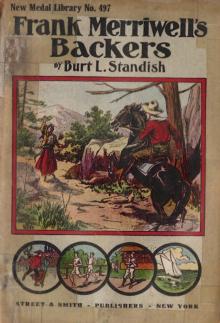 Frank Merriwell's Backers; Or, The Pride of His Friends
Frank Merriwell's Backers; Or, The Pride of His Friends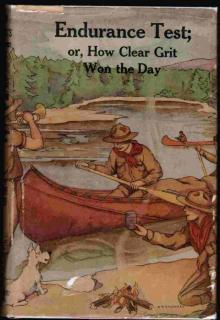 Endurance Test; or, How Clear Grit Won the Day
Endurance Test; or, How Clear Grit Won the Day Great Hike; or, The Pride of the Khaki Troop
Great Hike; or, The Pride of the Khaki Troop The Swan and Her Crew
The Swan and Her Crew A cup of sweets, that can never cloy: or, delightful tales for good children
A cup of sweets, that can never cloy: or, delightful tales for good children Frank Merriwell's Bravery
Frank Merriwell's Bravery Frank Merriwell Down South
Frank Merriwell Down South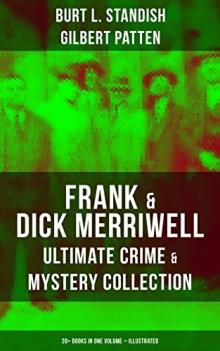 Dick Merriwell's Trap; Or, The Chap Who Bungled
Dick Merriwell's Trap; Or, The Chap Who Bungled The Trail of the Seneca
The Trail of the Seneca Wild Life in the Land of the Giants: A Tale of Two Brothers
Wild Life in the Land of the Giants: A Tale of Two Brothers From Squire to Squatter: A Tale of the Old Land and the New
From Squire to Squatter: A Tale of the Old Land and the New The Cruise of the Snowbird: A Story of Arctic Adventure
The Cruise of the Snowbird: A Story of Arctic Adventure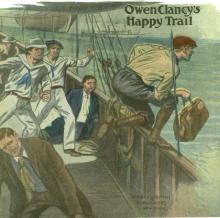 Owen Clancy's Happy Trail; Or, The Motor Wizard in California
Owen Clancy's Happy Trail; Or, The Motor Wizard in California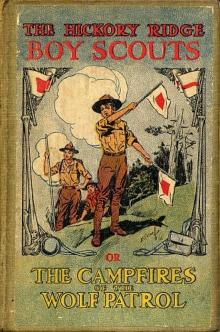 Boy Scouts: Tenderfoot Squad; or, Camping at Raccoon Lodge
Boy Scouts: Tenderfoot Squad; or, Camping at Raccoon Lodge Sing a Song of Sixpence
Sing a Song of Sixpence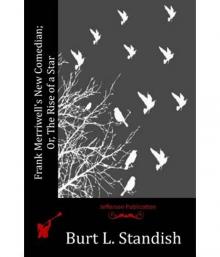 Frank Merriwell's New Comedian; Or, The Rise of a Star
Frank Merriwell's New Comedian; Or, The Rise of a Star The Sa'-Zada Tales
The Sa'-Zada Tales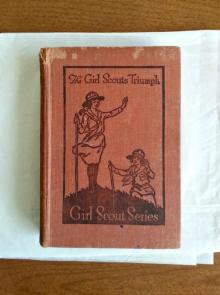 The Girl Scout's Triumph; or, Rosanna's Sacrifice
The Girl Scout's Triumph; or, Rosanna's Sacrifice Wild Adventures in Wild Places
Wild Adventures in Wild Places Fairies I Have Met
Fairies I Have Met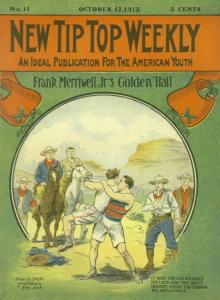 Frank Merriwell's Son; Or, A Chip Off the Old Block
Frank Merriwell's Son; Or, A Chip Off the Old Block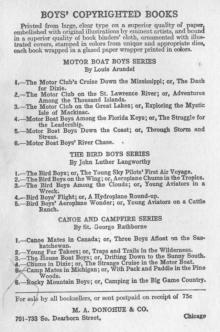 Motor Boat Boys' River Chase; or, Six Chums Afloat and Ashore
Motor Boat Boys' River Chase; or, Six Chums Afloat and Ashore Frank Merriwell's Athletes; Or, The Boys Who Won
Frank Merriwell's Athletes; Or, The Boys Who Won Bart Keene's Hunting Days; or, The Darewell Chums in a Winter Camp
Bart Keene's Hunting Days; or, The Darewell Chums in a Winter Camp Captain June
Captain June